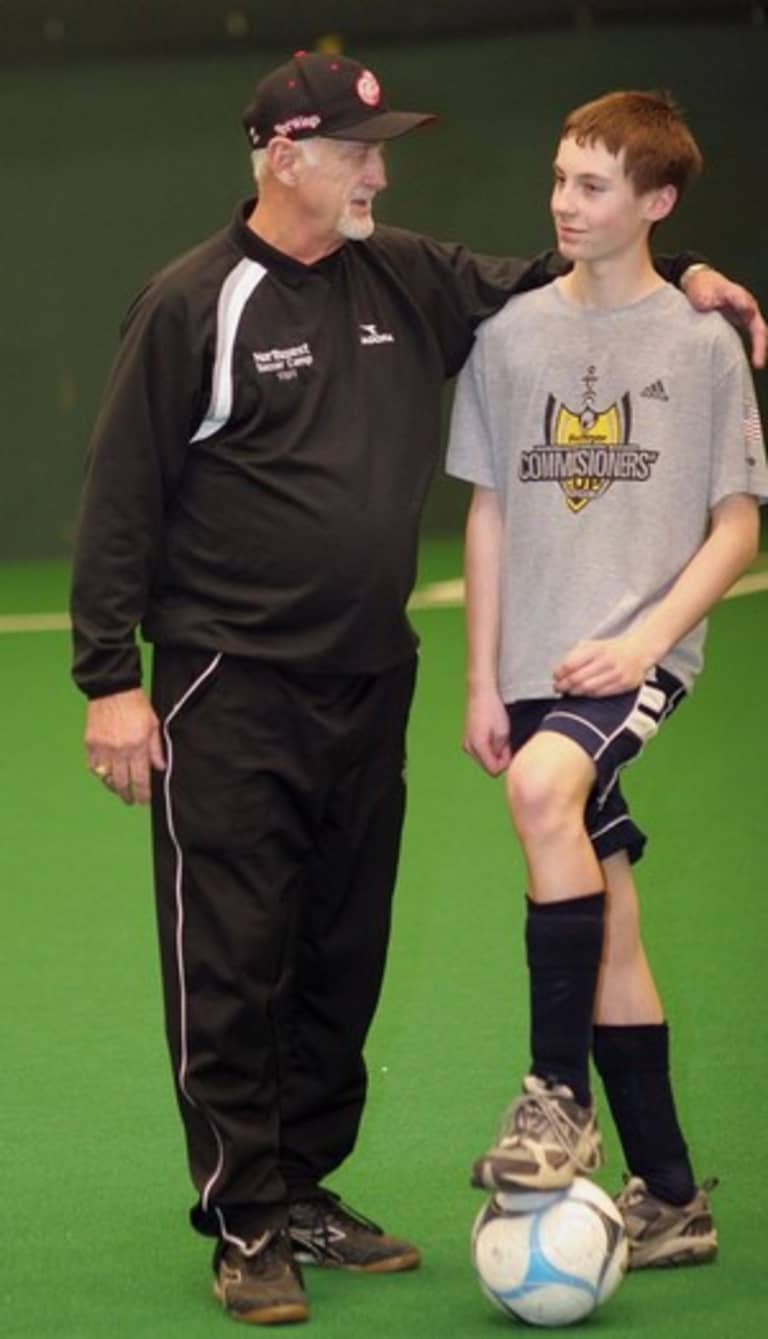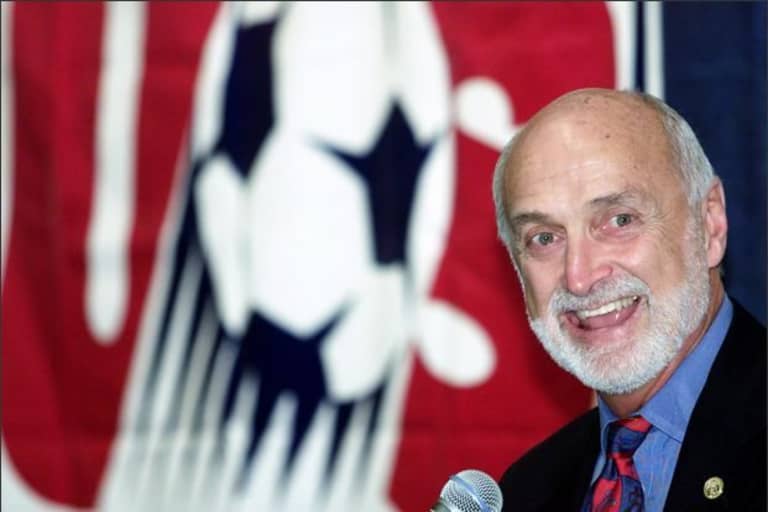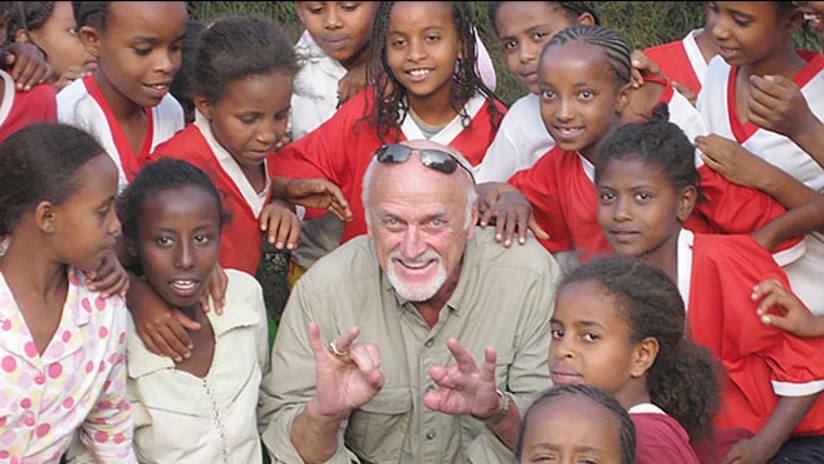Cliff McCrath will join play-by-play announcer Callum Williams on KSMO-TV for Sporting Kansas City's match at the Seattle Sounders on Saturday, live at 9:00 p.m. CT from Qwest Field. McCrath is one of the most distinguished men's soccer coaches in collegiate history and was inducted into the National Soccer Coaches Association of America Hall of Fame in 2009 after a 49-year career in coaching. He was also honored at the National Soccer Hall of Fame's Induction 2009 Ceremony.
McCrath, nicknamed the rubber nubber, has been influential throughout the history of the Seattle Sounders, helping form the foundation for the club's inaugural NASL season in 1974 and chairing Seattle's bid committee for MLS consideration in the early 1990's. SportingKC.com spoke to McCrath this week in advance of his guest role on the Sporting Television Network broadcast.
SportingKC.com: From what we understand, you went from a foster kid who didn’t have any exposure to soccer – let alone playing experience – until your sophomore year at Wheaton College to then amassing 597 career coaching victories, second all-time among college coaches when you retired. How do you account for that?
Fear. Just plain fear. Growing up in the streets of Detroit, you learn a couple of things. Number one, you learn to respect somebody. And if you can’t respect them, you fear them. Because the code for us was if you can’t beat ‘em, arrange to have ‘em beaten. And I only lost one fight in my life, when I slipped going around the corner. That’s exactly what fuels the rubber nubber.
SportingKC.com: Your resume speaks for itself: Five NCAA Division II championships at Seattle Pacific University and four additional championship appearances as runners-up. What made your tenure in Seattle so successful?

Well, I kid about the fear principle, but I think the core is what it’s all about. If you let the picture that other people develop influence your thinking, then that leads to bad decisions. It was a shepherd going against a giant. I don’t think anybody spent any time coaching David, who later became a king, about how to use a slingshot. It didn’t matter that the entire audience was cheering for the big guy, or at least sneering maybe, so I think you go into every game with an understanding that you have an opportunity if they let you take the field. Particularly in the game of soccer, which can be the craziest sport in the universe.
To wit, when I was coaching back in Michigan, we outshot a team 44-2 and the final score was 2-2. The press asked me, “What do you think of that?” I said, “I think this is the dumbest game ever played.” I said, “If this were basketball we would have beaten them 147-3.” So I think you go into the game and you take your players and their mentality with you saying, “You know what, let them talk about what they’ve got and let them sneer. But let’s wait until the end of the game and we’ll take a look at the final score.” And that’s pretty much been my mantra my entire career, even my playing career. I wanted to be a player for the Detroit Red Wings. I skated on the streets of Detroit. I didn’t have any idea what soccer was until I got to college.
SportingKC.com: In addition to an esteemed coaching career, you were a founding chair of Soccer in the Streets and Soccer Saves, as well as a global amputee soccer tournament. What drives you to build the sport in so many unique ways?
I’m kind of always absorbed in life. I make some speeches now and then to corporations and I found out a long time ago that coaching transcends sport. Coaching, obviously, is usually equated to something you do with a game or a sport, but a mother that can get her children to go to bed without the third World War breaking out is a great coach. I think that whole issue is trying to get somebody else to believe it’s in their best interest to help you achieve your goal. And if you can talk about the goal clearly enough and make it reasonable and make it something they would like to embrace. Instead of just one person believing that it can happen, you’ve got everybody else believing.
You know, Sporting KC has got a great team and they’ve got a phenomenal coach. Peter Vermes has been every place, Willingboro’s finest out there. It’s just a matter of understanding, it doesn’t really matter where you are at the moment. The Boston Red Sox started the season 2-10 and now they’re right there breathing down the Yankees back neck. And it’s not going to be long before they tell Tampa Bay it’s time for them to take over again.
So anyway , somebody says, hey, we’ve got another little project here with the same word or the same name on it and it has to do with helping kids in Africa or kids in the streets of Atlanta or Kansas City. And pretty soon you say, yeah, that makes sense, let’s see what we can do. And that’s pretty much what MLS is doing in the neighborhoods with their community service programs. I never put my hand up and asked to be involved, but I had a lot of other people say, “I think I see your hand up, come on over here and help us out.” And that’s pretty much why I stayed involved.

SportingKC.com: Did you decline to coach the original Seattle Sounders of NASL? What was your role in their formation?
That’s true. In fact, the joke is that I had nine different opportunities to coach in the old NASL. It went all across the landscape of the teams in those days. I only had a little more to do with putting the old Sounders together because the Nordstrom group had no idea what soccer was about. And Lamar Hunt, of all people, at the Scottsdale meeting the year before the Seahawks were granted their franchise, suggested their owners, while they’re waiting, look into soccer. They took it as a mandate, the owners came back to Seattle, had a lunch with anybody that was involved in soccer. Of course, Seattle Pacific, we were the most visible in town because the college game was picking up probably most of the ink. At the end of the lunch, they asked me to stay behind. About a half an hour later, they said, “We think we ought to put you on the road to visit the teams and then put together a performer,” which we did that led to the first Sounders. Before I left the meeting, I asked, “There was eight of us at the lunch, how come you asked me to stay behind?’” They said, “You’re the only guy that could speak English.”
So that’s kind of how we got started with the original Sounders. Of course, being involved with the television side of it for a while because I declined to do the coaching. Bottom line, I felt the league wasn’t going to last. I really felt that it was over-promoted and under-financed. And I didn’t want to be a doomsday guy or a nay-sayer, but it was clear in my gut that this was going to need a lot more than what Phil Woosnam and the administrative guys were preaching at the time. And I was all for it, I wanted to see the game succeed. But I just didn’t feel like it was going to last. So that’s why I stuck with the college game and kind of glad I did.
SportingKC.com: You mentioned you were a color commentator for the original Sounders. Of your many roles, what is it about the broadcast booth that you enjoy?
Today they’re not as interested in color as they are in analysis. Doing a game a couple years ago, Seattle and Dallas, Kevin Calabro who was there just the first year. One of the greatest NBA announcers, probably the best basketball play-by-play guy in the universe. And he made some comment about what was going on, because it was just crazy down on the field, they were scattered and it was all coming unglued. So Kevin said something about it and I said, “Well, I have absolutely no idea what’s going on down there.” You know, that’s color. That’s giving an honest report of what was kind of coming unraveled. I kind of expected Kevin to come back and say, “Well, of course you know what’s going on down there.” At which point, I said, “Yeah, that’s right. Seattle bombarded Dallas the first half and didn’t get a result. Dallas scored on a stoppage time goal in the 47th minute when it should have ended at 45. So they’re down 1-0. Then in the second half, of course it’s a goal that tied it up. They got kind of caught up in a long-ball situation, before long it was all frustration.” The bottom line is, that was color, instead of just giving a cardboard analysis. That’s what I like about it. If you can tell the truth and at the same time, be decent about it, then I think you enjoy it more and that’s what I enjoy.
SportingKC.com: You’re currently the Executive Director of the National Intercollegiate Soccer Officials Association (NISOA) and a Secretary-Editor on the NCAA Soccer Rules Committee. Can Sporting KC fans expect some insight on any controversial calls on Saturday?
Sure, why not? We can be truthful. That’s what you’re going to get from the rubber nubber, a truthful account. Just to let you know, those are things you have to fess up. That doesn’t mean you have to denigrate anybody, but it does mean you have to be willing to tell the truth. So sure, if I see something that looks like purple, I’ll call it purple. If it walks like a duck and talks like a duck, it’s probably a duck. Quack, quack, quack, quack.
Special thanks to Cliff for taking part in the Q&A. Be sure to tune in to the broadcast on Saturday night on KSMO-TV beginning with the First Kick pre-game show at 8:30 p.m. CT, followed by kickoff between Sporting Kansas City and the Seattle Sounders at 9:00 p.m. CT.


